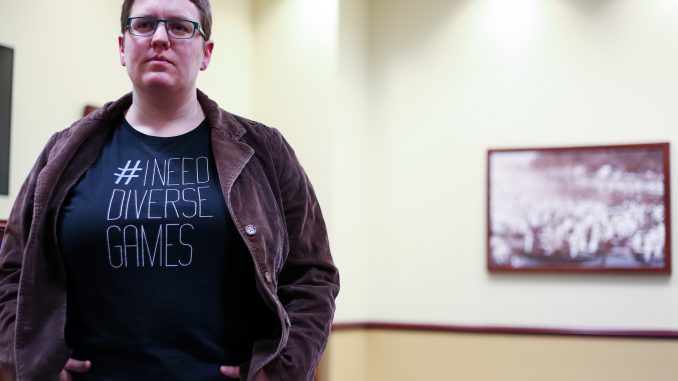
For one of Dr. Adrienne Shaw’s research interviewees, it wouldn’t matter if the chained-blade wielding male protagonist in the game, “God of War,” was replaced with a bunny rabbit.
This way of thinking, along with years of research conducted by Shaw, an assistant professor in Temple’s Media Studies and Production department, is detailed in her new book covering the issue of lacking diversity in video games.
The book, titled “Gaming at the Edge: Sexuality and Gender at the Margins of Gamer Culture,” discusses what Shaw calls the “intersection of representation” in video games, looking at race, gender, age and other identification factors as a whole.
On Feb. 19, Shaw gave a book talk and signing at her alma mater, the University of Pennsylvania, on the heels of the book discussion she held at Temple’s Annenberg Hall on Feb. 9.
Originally a sociology major at Mount Holyoke College, Shaw said she was always interested in media representation, but never considered communication studies as a possible career until she was encouraged to attend graduate school at Penn, where the study of video games was sparse.
“When I got to graduate school, it turned out that that was really interesting to the faculty there because there was only one other graduate student that was even vaguely interested in video games,” Shaw said.
With video games studies a relatively new field of study overall, Shaw’s interest in the medium needed plenty of research on her part to connect it with media representation.
“A lot of it was basically just teaching myself what games studies was,” she added.
Shaw’s argument for more diversity in video games has been an important issue as of late with other scholars, writers and journalists bringing up the issue. While most of the conversations about video games have been about their common violence and supposed impact on gamers’ interactions in real life, Shaw said she feels there has not been enough discussion and research about the importance of representation in this medium.
“If we get more research from a communications perspective, we might actually get a little more unpacking of representation in video games,” Shaw said.
Interestingly enough, Shaw’s audience studies, looking at marginalized groups of people playing video games, led to varied ideas about ways to diversify games.
People seemed to care about representation in certain video games more than others.
“The thing is that they’re not really saying representation doesn’t matter; they’re saying it matters in particular ways,” Shaw said. “The fact that representation doesn’t matter in a lot of games, is a really good reason to have more diversity in the games.”
Shaw’s research coincides with one of the courses she started at Temple, LGBT Representation, where her students look at LGBT representation in popular American media.
Caitlin McHale, a senior media studies and production major, sees the importance of considering diversity in all kinds of media-making, especially with her hopeful future in the production industry.
“So if games are being created by only one type of person, there’s only one perspective being reflected in whatever they create, which isn’t good in games or any other type of media,” McHale wrote in an email.
Julie Seidman, a senior double-majoring in communication studies and Russian, also feels that media representation is lacking as a whole, having an interest in queer theory herself.
“This is a problem in all media-producing industries,” Seidman said. “I wish that there was more varied representation from the producing standpoint.”
Albert Hong can be reached at albert.hong@temple.edu.


Be the first to comment